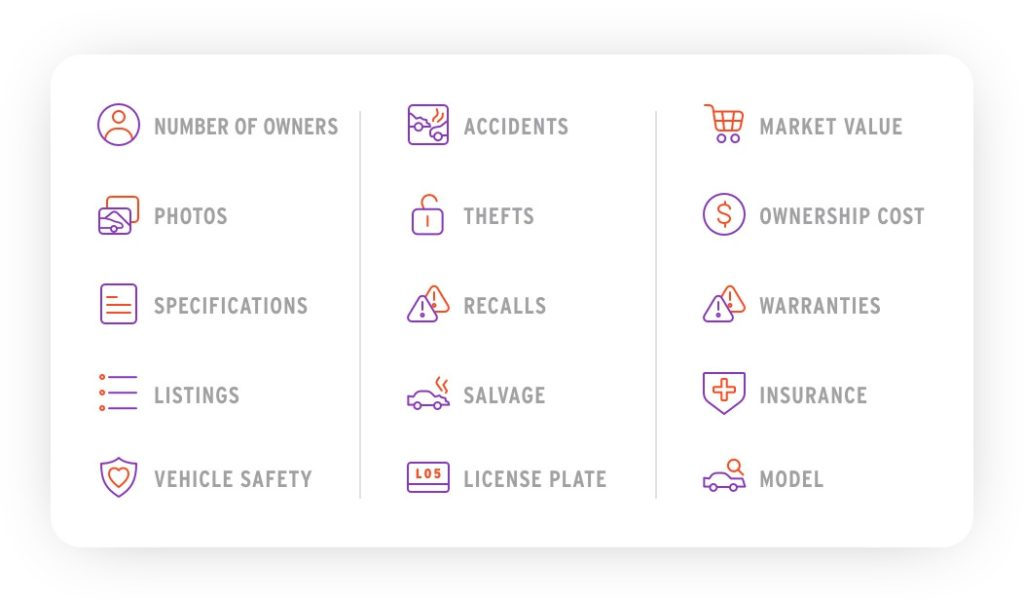Buying a used car can be tricky, especially when it comes to negotiating the price. However, negotiating the price is an important part of the process as it can save you hundreds or even thousands of dollars. In this article, we’ll share some tips to make the process easier for you.
Table of contents
1. Do your own research
When negotiating the price of a used car, it’s essential to arm yourself with solid information before you meet the seller in person. Relying solely on what the seller tells you, is an absolute taboo, whether they are a dealer or a private seller
Sellers may try to hide car issues (e.g. altered mileage or hidden damage) in order to sell the car for more than it’s worth. To avoid this, it’s recommended that you conduct your own research and obtain information about the car’s history from the day it was manufactured to the present.
Get an in-depth vehicle history report
The very first thing to do when negotiating the price of a used car is to get a vehicle history report. Though many sellers have vehicle history reports on hand, their report could be outdated or even false. So it’s always a good idea to obtain your own report from a reliable source. This allows you to verify the information provided by the seller and catch any discrepancies or issues that may have been missed.
A full history report can provide a wealth of information including:
![]() Vehicle specs
Vehicle specs
Accurate information about the car’s make, model, year, and other important details to ensure that you’re negotiating for the right car.![]() Accidents and Damage
Accidents and Damage
This can significantly affect the car’s value and may give you leverage in negotiations.![]() Maintenance and service history
Maintenance and service history
This can give you an idea of how well the car has been maintained and if any major repairs are needed.![]() Recalls on the vehicle
Recalls on the vehicle
If a used car has an outstanding recall that hasn’t been addressed, it can affect its value as it may require repairs that can be expensive or time-consuming.![]() Other important details such as theft records, salvage records, title status
Other important details such as theft records, salvage records, title status
To get your own history report, you’ll need a powerful and reliable vehicle lookup tool like BeenVerified. BeenVerified can help you learn more about a car than just its basic details. It will unmask the full past of a vehicle and discover any potential problems that a seller might try to hide (and which could impact its value).
- Go to the BeenVerified vehicle lookup page.
- Enter a VIN or a license plate number, then click SEARCH.
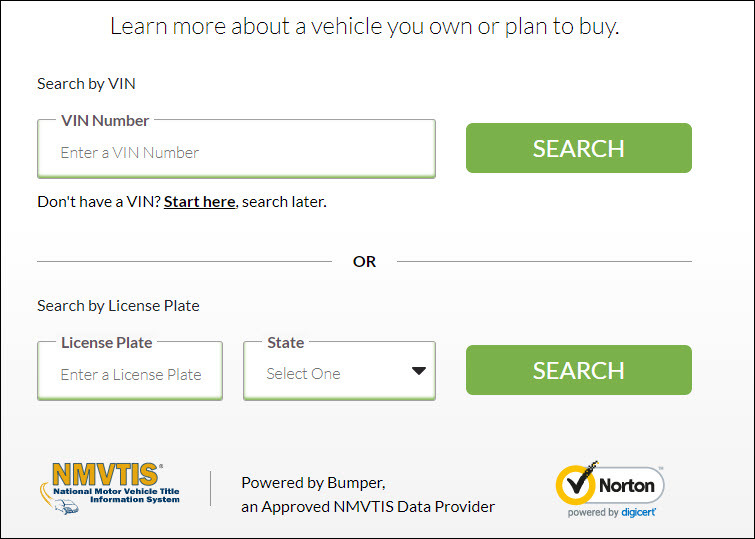
- Sit tight as BeenVerified collects records from its vast database. Within a few seconds, it’ll generate a detailed and easy-to-read report based on your vehicle.
You can perform as many searches as you want with one BeenVerified subscription. This can save you a lot of money if you’re looking at multiple cars.
Alternatives to BeenVerified include:
Bumper – Bumper offers five features in one place, including a VIN check, side-by-side comparison of vehicles, evaluation of vehicle value, real-time location tracking, and a one-stop shop for vehicles. The Bumper subscription allows unlimited searches while you are a member.
EpicVIN – EpicVIN is a NMVTIS data provider that uses blockchain technology to ensure that its database is secure and cannot be easily altered. It offers affordable and high-quality reports. If you only need one report, it is a cheaper alternative to BeenVerified.
Check the car’s market value
Before you start negotiating, it’s essential to research the fair market value of the car. This information will give you confidence and show you how much to negotiate on a used car. The good news is, a vehicle history report also include a Market Value sectionthat provides an estimated value range for the used car based on its make, model, year, and condition.
For example, the Market Value section of a BeenVerified vehicle report shows Retail value and Trade-in values:
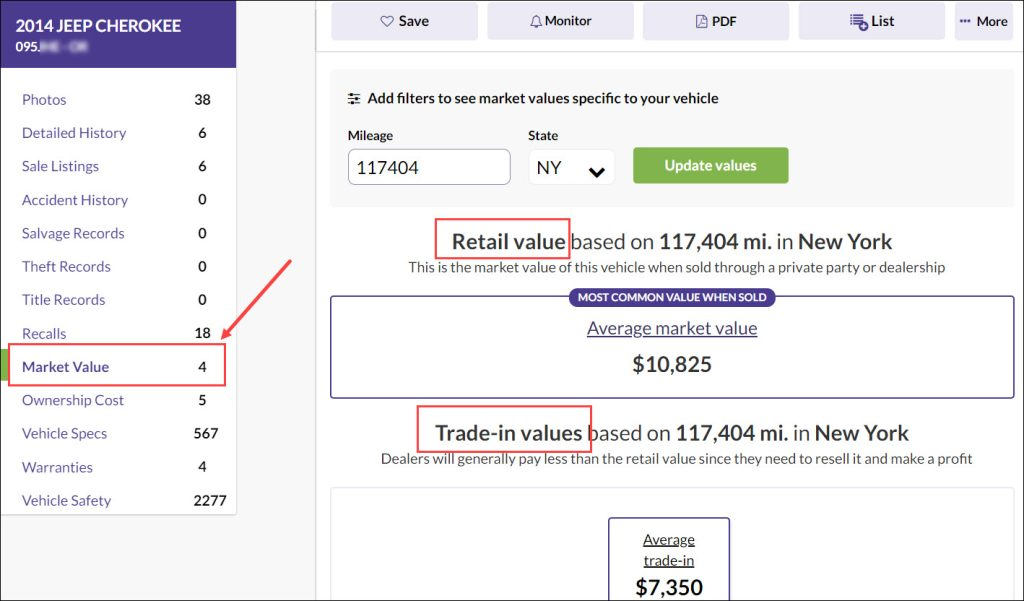
You can also check out comparable vehicles for sale, including the prices and detailed vehicle information.
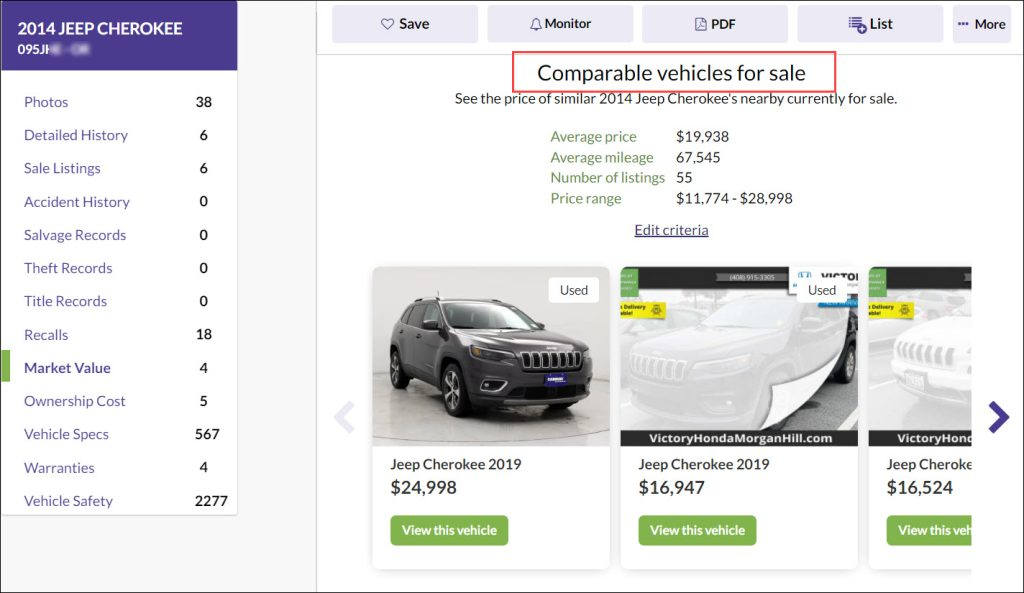
The Sale Listings of a car provides information on its previous sale prices and how long it took to sell. If a car has a history of selling quickly at a high price, it may indicate that the car is in high demand and has desirable features or condition. On the other hand, if a car has a history of being listed for sale for a long time with price reductions, it may indicate that the car has issues or is less desirable.
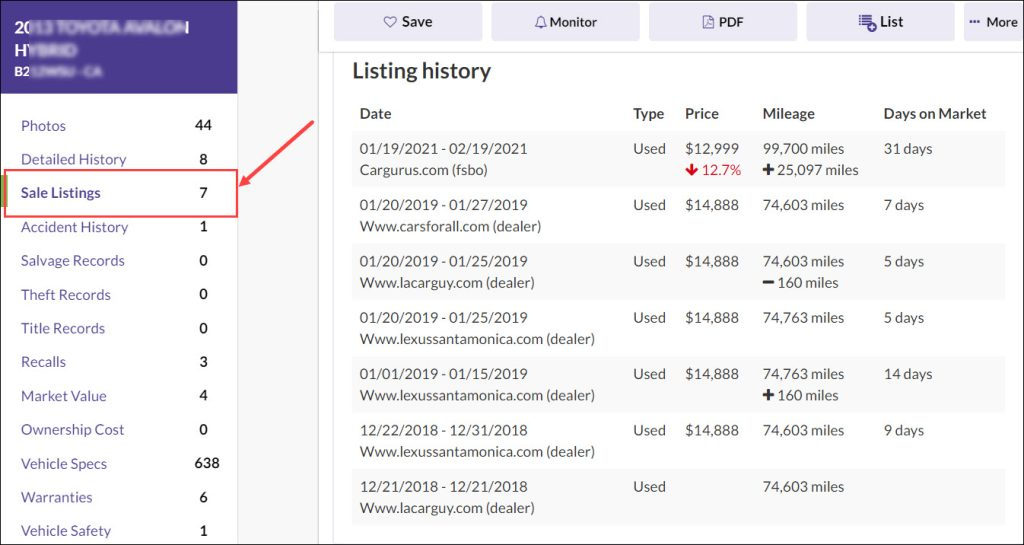
It’s always a good idea to consult multiple sources to get a more complete picture of a used car’s value before negotiating the price. So you can also check out other dedicated online resources that estimate the value of a car based on its VIN, such as Kelley Blue Book and Edmunds.
2. Inspect the car thoroughly
Inspect the car thoroughly before you start negotiating the price. Look for any visible signs of damage, wear and tear, or other issues that could affect the car’s value. Take note of any repairs that the car may need and factor these into your negotiation.
Inspect both the outside and inside of the vehicle
- Take a look at the outside of the car, paying attention to any scratches, dents or rust. Small scratches or dings are usually okay, but larger damage could be a problem.
- Make sure the body panels are lined up evenly because uneven panels may mean the car was in an accident and not fixed properly.
- Test the doors, hood, and trunk to see if they open and close easily.
- Look inside the hood, trunk, and doors for any paint that may have accidentally gotten on these areas. Make sure the color of the car matches on all parts. If you see paint that doesn’t match, it’s likely that part was fixed and repainted
- When checking the interior of a used car, keep an eye out for any rips or tears in the upholstery, as well as worn-out pedals and carpeting. These could be signs that the car has been driven more than the mileage displayed on the odometer suggests.
- Sit in all the seats and checking for any unusual damage or wear on the seats’ covering. If you notice a musty smell inside the car, inspect the carpet and floor mats for any indications of water leaks or damage.
- Check that the locks, horn, and lights are functioning correctly.
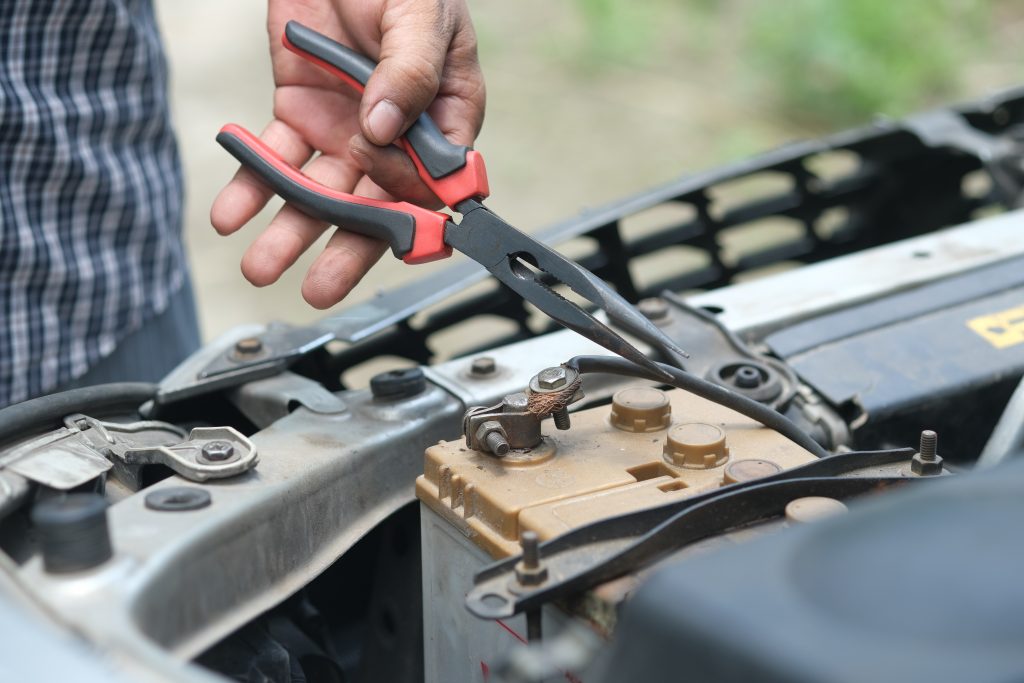
Hire an experienced mechanic
If possible, hire a competent mechanic to do a pre-purchase inspection. A experienced mechanic who specializes in a specific brand or model can identity any hidden issues or repairs that need to be done, giving you more leverage in the negotiation process. Once the inspection is done, request the mechanic to provide a written report. This report should mention the cost estimation for all repairs that are required. Ensure that the report includes the car’s make, model, and VIN.
You can easily book inspection services from local auto repair shops. There’re also websites that allow you to book an appointment online, select the type of inspection you want, and choose a mechanic to perform the inspection. Some of the most popular and reputable ones include:
3. Work out the financing in your favor
It’s important to consider other factors in addition to the price to make the most informed decision possible. For example, if you plan to finance, it’s crucial to shop for the best interest rate. A car with a slightly higher purchase price but a lower interest rate may end up being a better deal in the long run.
Lower the total interest
Be careful when considering low monthly payment offers because they often come with longer loan periods and higher interest rates, making them more expensive overall. Make sure you know the total cost with financing before making a decision.
Compare financing options from different sources like dealers, banks, credit unions, and finance companies. When you’ve chosen the best financing option, you may want to put more money down or shorten the loan length to decrease the total interest you’ll pay over time.
Get a pre-approved auto loan
To negotiate better when buying a car, get a pre-approved auto loan before going to the dealership, even if you’re not sure if you’ll use it. This makes you a “cash buyer” and puts you in a stronger negotiating position.
Tell the dealer that you’re pre-approved, but you’re willing to look at their financing options. Dealers usually have connections to lenders and can offer you better interest rates. They might even lower the car’s price further to win your financing.
4. Use price negotiation tactics
To negotiate like a pro, it’s important to use common yet effective negotiation tactics, especially those that leverage the seller’s motivations and pressures to your advantage.
Time your negotiations
Timing your negotiations can be important. Consider negotiating at the end of the month, when salespeople may be more willing to make a deal to meet their quota.
Start low
It’s quite basic but worth noting. When you start negotiating, don’t immediately say the highest price you’re willing to pay. Start with a low offer, but not too low that it’s insulting. This gives you room to negotiate up and shows the dealer that you’re serious about getting a good deal.

Use competing offers
If you have competing offers from other sellers for similar cars, use that as leverage in your negotiations. Let the seller know that you’re considering other options and that they need to make a compelling offer to win your business.
Be prepared to walk away
If a dealer agrees or gets very close to your price, tell them you’re willing to buy immediately. This shows you’re not interested in further negotiations. You’ve already done your homework, compared prices from multiple dealerships, and arrived at a fair price for the car. If the dealer isn’t getting near your offer, or if the salesperson keeps going back to their manager, it might be a good idea to walk away. Leave your name and number with the salesperson so that they can call you if they change their mind.
5. Negotiate for additional perks and benefits
If the dealer is unwilling to lower the price of the car, it’s worth considering other options that can sweeten the deal. So don’t be afraid to ask for extras. These extras can add significant value to the car and help make a higher purchase price more justifiable.
For example, you could ask for a warranty or extended service contract, which can provide added protection and peace of mind down the line. Free maintenance packages or service appointments can also be a valuable perk, saving you money on routine upkeep and repairs. Another option is to ask for accessories or upgrades to be included in the purchase, such as a new set of tires, upgraded sound system, or other enhancements.
That’s pretty much all we have to share on how to negotiate the price of a used car. Hope you find the post helpful!



